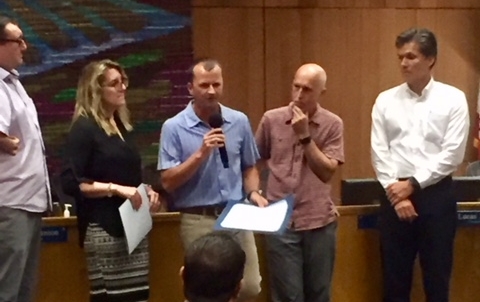Tuesday night we were honored to receive the 2017 Environmental Recognition Award from the City of Davis. Candidly, it was humbling and nerve-wracking. Here's a link to a video of the ceremony, and below are my rambling, bambling thoughts:
This is like the Academy Awards for us climate geeks, the anti-Scott Pruit. Thank you very much.
I am a solar simpleton. Credit for this award goes to the several hundred property owners we have helped go solar, and the little organization that is the sustainability heartbeat of our community, Cool Davis.
Ours is a community that greatly values sustainability. We value walking and riding our bikes. Driving cars that get good gas mileage, that perhaps are electric. We value making our own energy and growing our own food. We value recycling. We value conserving. And, with all those values, any time any of us do these things, it puts more money back in to our community, because we’re not paying more for gas or electricity or food.
Hence, sustainability to me is not just simply about reducing our GHGs and carbon footprint, but it’s about building a sustainable economy. But, our values have no value if we fail to make an investment in our community. We’re simply winking in the dark, kinda kidding ourselves. Because without an investment, our values are just that: They have no value.
I would like to thank the Council, the Natural Resources Commission, blah blah, mumble mumble.
Past recipients include several of our friends, colleagues, and partners in the climate change fight ... here's a list of businesses that have been honored:
1995 – Ridge Builders Group, Inc.
1996 – Davis Energy Group
1997 – Davis Food Co–op
1998 – Tandem Properties, Inc.
1999 – Calgene LLC
2000 – (none)
2001 – Davis Food Co–Op
2002 – (none)
2003 – Screaming Squeegee Screen Printing & Embroidery
2004 – Sunmart, Inc.
2005 – Harrington Place
2006 – Island Ink Jet
2007 – (none)
2008 – MAK Design+Build, Inc.
2009 – Kiwi Tree
2010 – Hallmark Inn
2011 – Waste Busters
2012 – Café Italia
2013 – Da Vinci High Charter Academy
2014 – (none)
2015 – Neighborhood Partners, LLC
2016 – Sierra Energy
2017 – Indigo Hammond + Playle Architects; Whole System Designs
Muchas gracias to all for providing us the opportunity to serve our community and planet. Again, we are honored.






